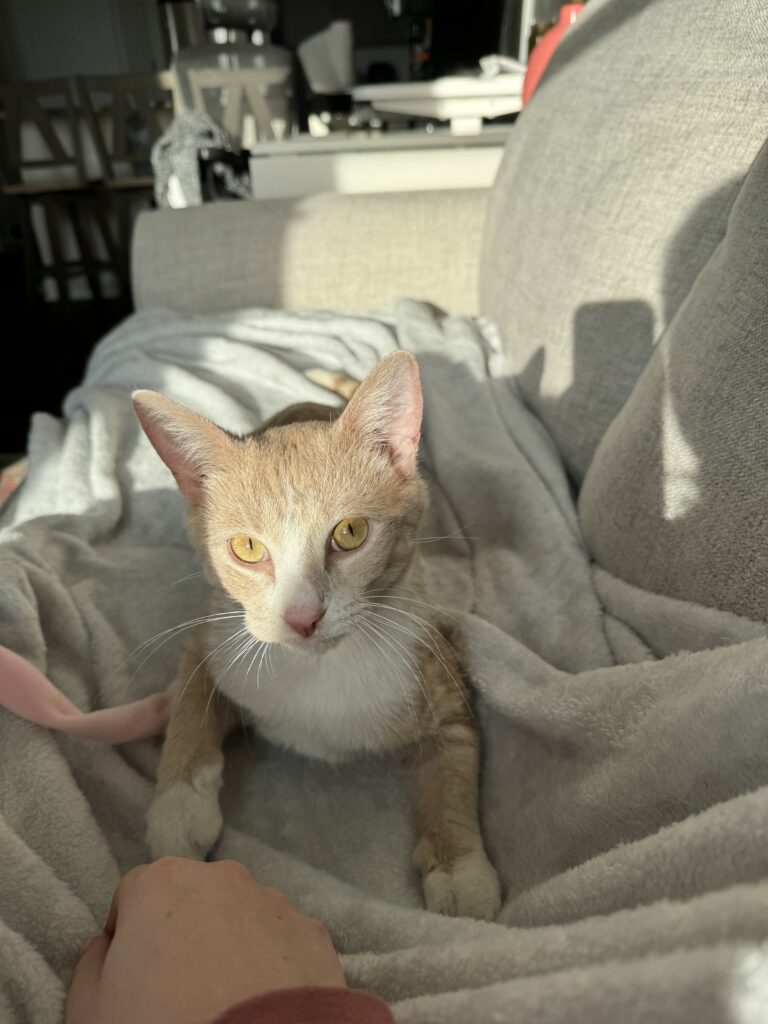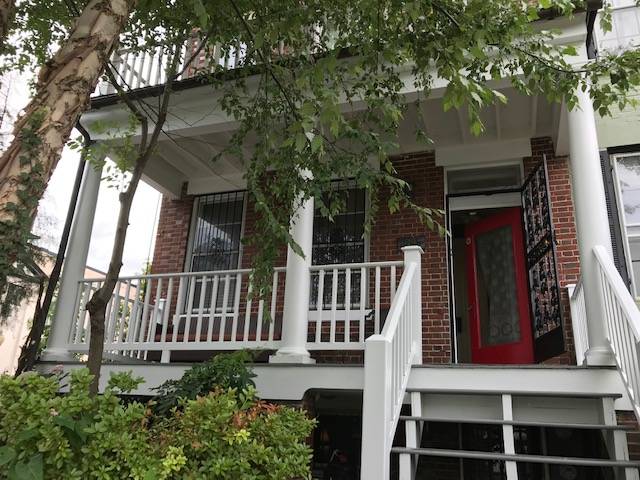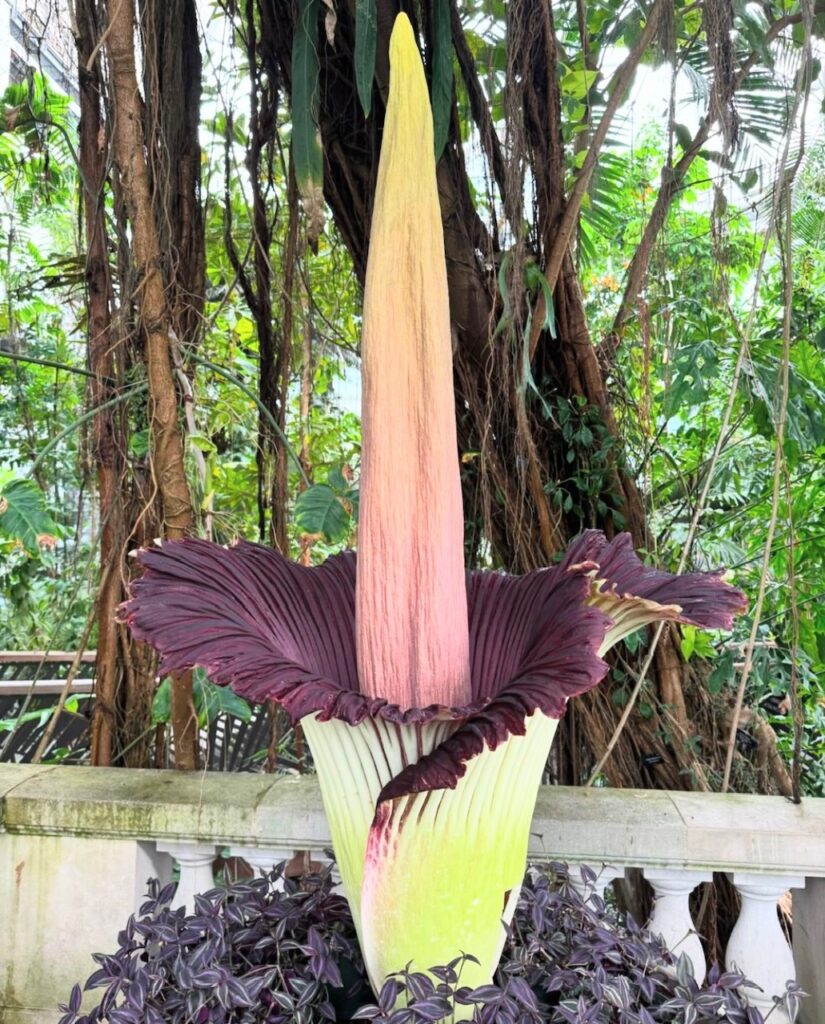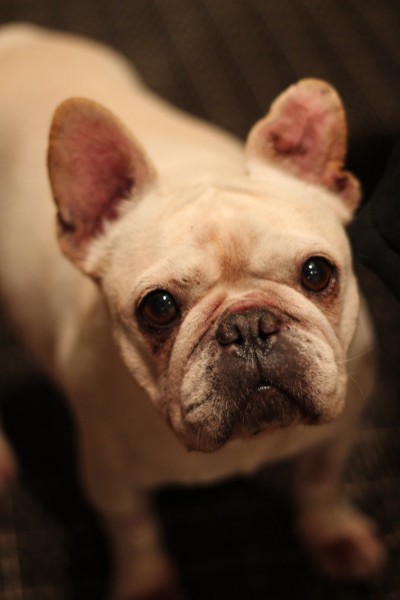
Giselle
The following was written by PoP contributor Eric Nuzum.
French Bulldogs rarely show up in shelters and rescues. They are expensive dogs and difficult to breed. Anyone who goes through what it takes to get one usually isn’t very quick to let it go. Those that do come up for adoption are usually seriously ill or disabled.
That’s why we were so surprised to see Giselle listed for adoption. A four-year-old Frenchie, rescued from a high kill shelter in South Carolina. Besides testing positive for heart worm, she was described as good with kids and dogs, didn’t have behavior issues, and seemed otherwise perfectly fine.
More than a hundred people applied to adopt her, but we were the ones told she would be coming home with us on December 3rd. The only thing we really knew about her history was that her previous owner gave her up for financial reasons.
I was instructed to pick her up at a transport drop–where rescue volunteers bring more than 40 dogs in stacked crates, bungee corded together in the back of a large cargo van for the ten-hour drive from South Carolina.
Giselle was one of the first dogs off the van and almost immediately I could tell that her time in the shelter had not been good. She was caked with dirt, had a mangled ear and scabs on her face from a fairly recent attack by another dog, had infections in both ears, and was constantly straining to poop, probably from stress. She was disoriented and nervous, yet still desperate for any comfort or affection. I placed her head in my hands after putting her in the backseat of the car. “Don’t worry little girl,” I whispered to her. “The worst part is over.” She licked my nose and we drove home, already pretty much bonded.
Continues after the jump.
The next morning we took her to the vet for a check-up and almost immediately the doctor noticed something unusual: Giselle’s gut was rock hard. As she examined the dog, the expression on Dr Rusk’s face got more and more serious. An x-ray confirmed her fear–Giselle had a distended colon. A section of her colon had lost its motility and stool had been backing up there for weeks.
Dr Rusk also said Giselle was nowhere near four, but more likely at least nine or ten-years-old. The colon issue was more than likely the result of a neurological disorder, arthritis or some other age-related complication. It might be treatable with medication, but for now she was in immediate need of treatment to remove the hardened stool.
Giselle was admitted to the hospital and received multiple laxatives and four enemas over two days. She had racked up a two-thousand dollar hospital bill with little sign of anything actually helping her. Dr. Rusk said we were running out of options, our choices for our new dog were suddenly limited to a six-thousand dollar surgery or euthanizing her.
And all this for a dog we’d had for less than three days.
Though we had nothing to prove it, a probable narrative for Giselle started to emerge in our minds. We knew that this colon issue had been going on for some time before she was given up. More than likely her previous owners had learned of her situation, pained over the same dilemma we were now facing, were unable to make a decision, and decided to turn her over to the shelter. Little did they know that by doing so, they were condemning her to the living hell and misery in that shelter.
Regardless of the true story, there was little doubt that this can had been kicked down the road a few times and had landed squarely with us.
We’d been wringing our hands over the situation we were in and which terrible option to chose when Dr Rusk called. Giselle had pulled off an eleventh hour miracle and was starting to pass the old stool. We weren’t out of the woods yet, but at least she’d have a chance to come home. The doctor told us that, even with medication, this would eventually catch up with her again, but it could be months or years–nobody knew.
Now we faced what felt like an even bigger challenge: knowing how this would end up, did we want to let this dog into our lives? She was sweet and personable. If you didn’t know what was happening to her, you’d never even guess this dog was sick. She had every reason not to be, but she was a trusting, affectionate dog who obviously yearned for love, safety, and belonging. We were already in love with her, but pretended we weren’t.
We really didn’t make a decision, if there was ever was a decision to be made. We just went to the hospital and brought her home. She was obviously feeling much better than when we first picked her up. She was calm, relaxed, and immediately made a place for herself in our family. She got along well with our other Frenchie and our two-year-old son quickly fell in love with her just as much as we did. Even though she was on eight different medications, she seemed to get perkier and stronger every day. She started learning the routines of our household and was even picking up a few commands and tricks. It started to feel like things were going to be okay. Her days were filled with belly rubs, long walks, treats, and the sounds of laughter.
We saw bits of her personality start to emerge. She loved to chase and tease, as well as snatch the baby’s toys so he would run with her. She spent every evening sleeping in my wife’s lap. Here is a dog that should have no reason to trust any human being, yet she was so accepting of any love or attention anyone gave to her. She was not just a survivor, but a survivor with grace.
Then a week later, I was walking the dogs when I noticed Giselle was straining to poop again. Over the next two days, she stopped pooping entirely. A visit to Dr Rusk confirmed our worst fear, that Giselle’s colon was starting to back up again. It had probably been backing up since we left the hospital.
Now we were faced with a third terrible choice–do we hospitalize her again, knowing the cost and chance that it will only be another temporary fix?
Dr. Rusk loaded her with fluids and laxatives, and we decided to give her another day to get things moving. Despite now being on ten medications, Giselle’s colon just wasn’t cooperating.
We believed that God had given Giselle to us because others had not been able to make the right choice for her. Our job was to make her feel safe, loved, and part of our family. We also had to admit that part of loving her was being able to say enough was enough. It was our job to prevent any more suffering.
After one last game of chase with the dogs and baby, plus a long extended belly rub and fistful of treats, we took her back to Dr. Rusk.
We both wanted to be there with her when she was put down. She felt just as much a part of our family as any other member. The last thing she felt was our hands petting her. The last thing she heard was us telling her how loved she was.
At times, when I think of Giselle, I feel a little silly. I mean, we’ve been mourning her longer than we had her. Isn’t it a bit ridiculous to grieve over the loss of a dog you had for ten days?
My wife plans to spread her ashes in Rock Creek Park, along a trail that she regularly jogs along. Not only so that she is reminded of the sweet little French Bulldog who so easily convinced us to love her, but also as a reminder of what this taught us.
When hearing this story, people understandably ask if we regret adopting Giselle. They often are surprised when we quickly answer “no.” Many people, including us, idealize the concept of “rescuing” a dog. We romanticize our role as saviors, bringing a dog back to its “furever” home. With Giselle, that obviously worked out a bit different. We were called to make a decision that no one else could or would make for her. We also could have never imagined we’d have the strength to make it through that two-week gut-wrenching ordeal, and yet still willingly give ourselves over to falling for a dog we knew was not going to make it.
In the end, we did rescue her, just not in a way we ever thought we could.
Recent Stories
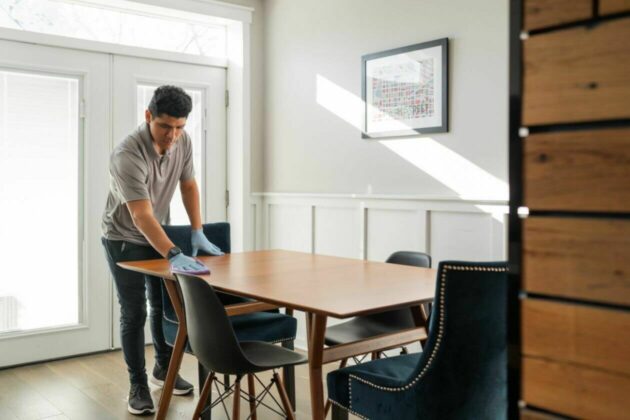
For many remote workers, a messy home is distracting.
You’re getting pulled into meetings, and your unread emails keep ticking up. But you can’t focus because pet hair tumbleweeds keep floating across the floor, your desk has a fine layer of dust and you keep your video off in meetings so no one sees the chaos behind you.
It’s no secret a dirty home is distracting and even adds stress to your life. And who has the energy to clean after work? That’s why it’s smart to enlist the help of professionals, like Well-Paid Maids.

Unlock Peace of Mind for Your Family! Join our FREE Estate Planning Webinar for Parents.
🗓️ Date: April 25, 2024
🕗 Time: 8:00 p.m.
Metropolitan Beer Trail Passport
The Metropolitan Beer Trail free passport links 11 of Washington, DC’s most popular local craft breweries and bars. Starting on April 27 – December 31, 2024, Metropolitan Beer Trail passport holders will earn 100 points when checking in at the
DC Day of Archaeology Festival
The annual DC Day of Archaeology Festival gathers archaeologists from Washington, DC, Maryland, and Virginia together to talk about our local history and heritage. Talk to archaeologists in person and learn more about archaeological science and the past of our


